This article was co-authored by Sari Eitches, MBE, MD. Dr. Sari Eitches is an Integrative Internist who runs Tower Integrative Health and Wellness, based in Los Angeles, California. She specializes in plant-based nutrition, weight management, women's health, preventative medicine, and depression. She is a Diplomate of the American Board of Internal Medicine and the American Board of Integrative and Holistic Medicine. She received a BS from the University of California, Berkeley, an MD from SUNY Upstate Medical University, and an MBE from the University of Pennsylvania. She completed her residency at Lenox Hill Hospital in New York, NY and served as an attending internist at the University of Pennsylvania.
There are 11 references cited in this article, which can be found at the bottom of the page.
This article has been viewed 157,793 times.
Ah, sleep. The world we can finally escape to after a long day - if we're lucky. Sometimes, when you have a lot on your mind, sleep can be elusive. Improve your sleep habits with useful solutions like improving your sleep setting, creating a bedtime routine, and avoiding things that keep you up at night.
Steps
Preparing the Sleep Environment
-
1Keep it dark in your room.[1] Artificial lights set your internal clock to "awake" when you should be asleep, suppressing the release of the sleep hormone melatonin. On the contrary, turning off the lights prior to bed gives your body the signal that it is night-time and sleep-time.[2]
- Use light-restricting black out curtains.
- Switch to lower-wattage lamps as you get ready for bed.
- Use a night light for late-night toilet runs.
- Put away digital clocks with glowing displays.
-
2Keep the room at a good temperature.[3] Make sure the room is at a comfortable temperature for you. The human body temperature should be cooler that during daytime hours - most experts suggest the temp should be at least 5 to 10 degrees cooler. It depends on your personal preference, but the best sleep is between 60 and 67 degree Fahrenheit. [4]Advertisement
-
3Limit noises.[5] You may be able to drift off to sleep with background noise, but, in the wee hours of the night, sound can easily pull you from your slumber. If you fall asleep to music, set a timer so that it goes off 20 to 30 minutes later. If your bedroom is positioned near a noisy intersection, or your neighbors are rambunctious night owls, grab a pair of earplugs to ensure a peaceful night's rest.[6]
-
4Make your bedroom strictly for bedroom activities.[7] If you are talking on the phone, watching TV, or eating late-night snacks in your bed, your body will find it hard to associate this zone for resting. Make the bedroom a technology-free zone. Use your bed primarily for sleeping and sex, so that falling asleep gets easier.
Unwinding Before Bed
-
1Complete a relaxing bedtime ritual.[8] In order to calm yourself for sleep, engage in soothing activities. It's up to you what you choose to do. Some ideas include reading a book or magazine, listening to books or speeches on tape, drinking herbal tea, doing light stretches, and making small preparations for the next day like brushing your teeth or laying out clothing.[9]
-
2Take a hot bath. A hot bath can help your body relax, and thus, your mind. Taking a 20 to 30 minute hot bath will cause a rise in your temperature, which will drop steadily after you exit the tub. This drop in temperature will make it easier to drop off to sleep.[10] .
- Try using essential oils used in relaxation (e.g. lavender) as an added bonus
-
3Listen to music. Playing some soft, soothing tunes as you bathe or complete your winding down routine can be relaxing and help you calm daily stressors. Download a sleep music app on your smartphone, simply select a playlist of music you already own, or listen to a playlist on YouTube.
- In one study, researcher effectively used classical music to improve sleep problems in younger people with insomnia.[11]
-
4Write down tomorrow's to-do list to ease late-night worry. Not only might you be better prepared and organized for the next day, you may also avoid lying awake worrying about the following day and enjoy a better night's sleep overall.
-
5Practice relaxation exercises[12] . Actively seeking relaxation may help you get a better night's sleep and quell anxiety or worries that creep up at bedtime.
- Deep breathing.[13] Sit or lie comfortably. Take a long, deep breath in through your nose, noticing your abdomen rise. Hold the breath briefly. Exhale the breath as your abdomen deflates. Repeat this cycle between 6 to 10 times.
- Progressive muscle relaxation.[14] Take deep, cleansing breaths. Close your eyes. Start with your feet muscles. Clench them tightly, holding the tension for about 5 seconds. Then, release the tension. Slowly work up through your body contracting and releasing each muscle group.
- Guided imagery. This is a visualization activity that allows you to imagine a calming place or state of being. This exercise is often most helpful if beginners complete a guided version rather than trying it on your own.
Recognizing Barriers to Good Sleep
-
1Turn off electronics. Your body's circadian rhythms seem to be very sensitive to the blue light given off by electronic devices like TVs, cell phones, and tablets. Using these devices before bed can interfere with the release of melatonin, the body's sleep hormone. Turn electronics off at least an hour before bed.[15]
-
2Be weary of food and beverages. The food and drink you consume throughout a day can have a dramatic effect on the quality and quantity of sleep you receive. Follow these strategies:
- Eat 2 to 3 balanced meals containing fruits, veggies, lean protein, whole grains, and low-fat dairy. Eat your last meal at least 2 to 3 hours before bed.
- Avoid late-night snacking or drinking which can interrupt sleep for bathroom runs.
- Know that smoking cigarettes can be detrimental to healthy sleep.
- Avoid caffeine and alcohol for up to 4 hours before bed.[16]
-
3Exercise. When receive the nationally recommended amount of 150 minutes of vigorous physical activity each week you tend to sleep better for it. Regular exercise not only improves physical health but can also give you energy to eliminate daytime sleepiness and enhance concentration.[17]
- Be sure to engage in at least 30 minutes of vigorous exercise each day. This can include walking, hiking, swimming, dancing, or biking.
-
4Set a worry period for earlier in the day. Worry can be a primary factor keeping you up at night. To prevent worrying from affecting your sleep, create a worry period in the late afternoon or early evening.
- A worry period allows you to postpone worries until a given time so that you can adequately enjoy your day.[18] Choose a short period - about 20 to 30 minutes. If a worry crosses your mind prior to your worry period, merely write it down and tell yourself you will attend to it later.
- During your worry period, go over all the worries you have collected during the day. Aim to problem-solve each one so that it does not continue to haunt you.
-
5Create a regular sleep schedule, and stick to it. Sleeping in or staying up late on some days can wreak havoc on your circadian rhythms. Keep regular hours by going to sleep and waking each day around the same time.[19]
Warnings
- Avoid caffeinated drinks before bed.⧼thumbs_response⧽
- If after practicing the sleep hygiene tips provided above you continue to have difficulty falling asleep or staying asleep, see a doctor for a thorough medical evaluation. You may be suffering from insomnia or some other medical or psychological condition that is affecting your ability to sleep.⧼thumbs_response⧽
- If you are thinking of meditating, you might want to be in bed to prevent falling asleep on the floor.⧼thumbs_response⧽
- Don't take sleeping pills. These drugs can be dangerous and addictive.⧼thumbs_response⧽
References
- ↑ Sari Eitches, MBE, MD. Integrative Internist. Expert Interview. 3 April 2020.
- ↑ https://www.healthnavigator.org.nz/healthy-living/s/sleep-tips/
- ↑ Sari Eitches, MBE, MD. Integrative Internist. Expert Interview. 3 April 2020.
- ↑ https://www.betterhealth.vic.gov.au/health/conditionsandtreatments/sleep-hygiene
- ↑ Sari Eitches, MBE, MD. Integrative Internist. Expert Interview. 3 April 2020.
- ↑ https://www.betterhealth.vic.gov.au/health/conditionsandtreatments/sleep-hygiene
- ↑ http://www.health.harvard.edu/sleep/8-secrets-to-a-good-nights-sleep
- ↑ http://www.helpguide.org/articles/sleep/how-to-sleep-better.htm
- ↑ Sari Eitches, MBE, MD. Integrative Internist. Expert Interview. 3 April 2020.
- ↑ https://www.cci.health.wa.gov.au/~/media/CCI/Mental-Health-Professionals/Sleep/Sleep---Information-Sheets/Sleep-Information-Sheet---04---Sleep-Hygiene.pdf
- ↑ http://www.ncbi.nlm.nih.gov/pubmed/18426457
- ↑ http://www.helpguide.org/articles/sleep/how-to-sleep-better.htm
- ↑ http://www.health.harvard.edu/mind-and-mood/relaxation-techniques-breath-control-helps-quell-errant-stress-response
- ↑ https://www.anxietycanada.com/sites/default/files/MuscleRelaxation.pdf
- ↑ https://www.cdc.gov/sleep/about_sleep/sleep_hygiene.html
- ↑ Sari Eitches, MBE, MD. Integrative Internist. Expert Interview. 3 April 2020.
- ↑ https://www.cdc.gov/sleep/about_sleep/sleep_hygiene.html
- ↑ https://www.studenthealthatshu.co.uk/website/C88007/files/The%20Worry%20Time%20Technique.pdf
- ↑ https://www.cci.health.wa.gov.au/~/media/CCI/Mental-Health-Professionals/Sleep/Sleep---Information-Sheets/Sleep-Information-Sheet---04---Sleep-Hygiene.pdf
About This Article
To calm yourself and get to sleep, try deep breathing by inhaling through your nose, briefly holding the breath, and exhaling again to quell any anxiety you might have. You can then try progressive muscle relaxation by closing your eyes and clenching your feet muscles tightly for five seconds. After you've release them, slowly work your way up your body by contracting and releasing each muscle group. If you need to calm yourself. Additionally, you can try listening to soft, soothing tunes like classical music. If you find yourself stressing about the day ahead, consider writing a to-do list so that you feel better prepared and less anxious. For more tips from our co-author, including how to adapt your environment for better sleep, read on!
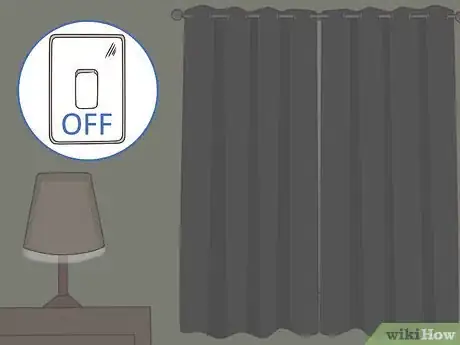


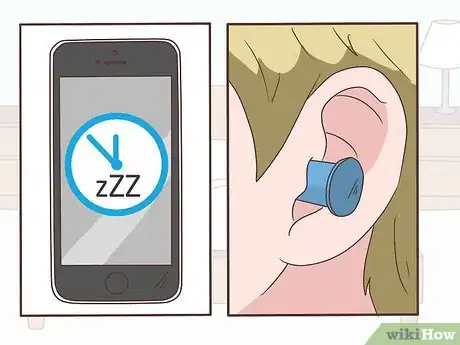
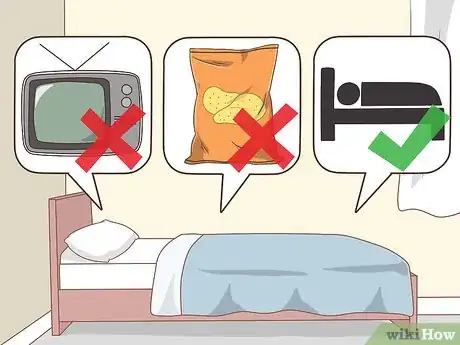
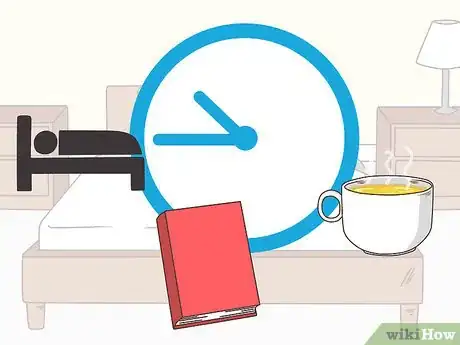


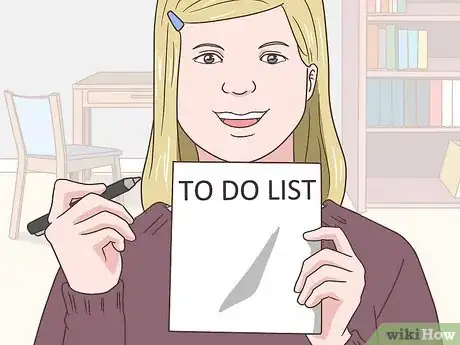
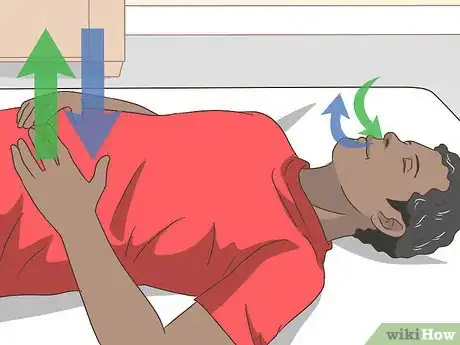
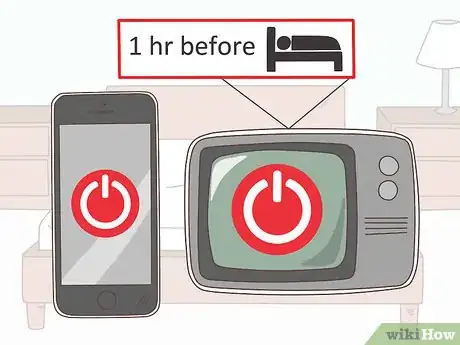
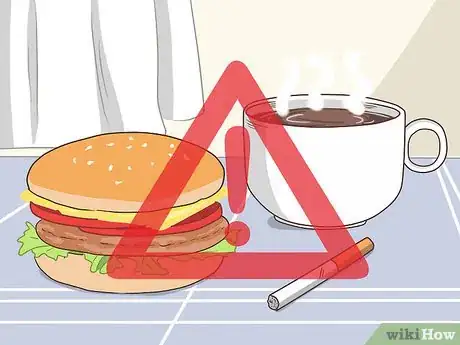

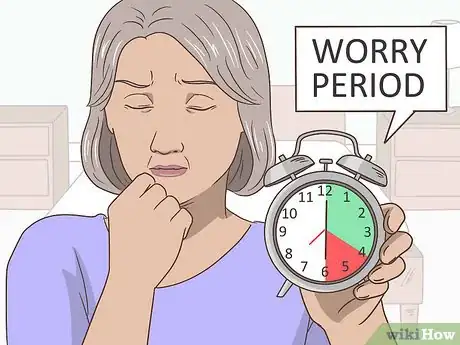






-Step-10.webp)

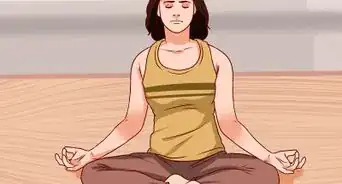




















































Medical Disclaimer
The content of this article is not intended to be a substitute for professional medical advice, examination, diagnosis, or treatment. You should always contact your doctor or other qualified healthcare professional before starting, changing, or stopping any kind of health treatment.
Read More...